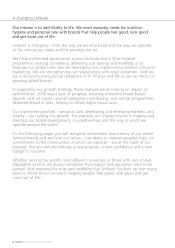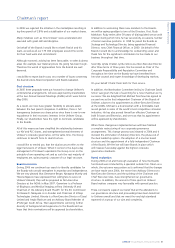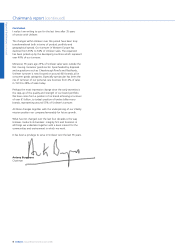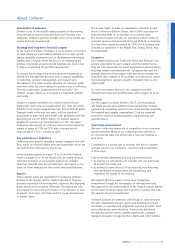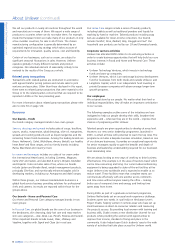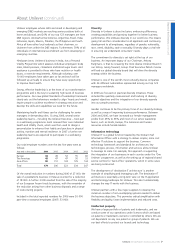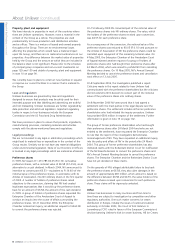Unilever 2006 Annual Report Download - page 15
Download and view the complete annual report
Please find page 15 of the 2006 Unilever annual report below. You can navigate through the pages in the report by either clicking on the pages listed below, or by using the keyword search tool below to find specific information within the annual report.
12 Unilever Annual Report and Accounts 2006
Report of the Directors (continued)
Group Chief Executive (continued)
What did you mean when you said last year that the
successful brands of the future would be those that not
only satisfied consumers’ functional needs, but also
addressed their concerns as citizens?
We have always believed that the health and prosperity of our
business is linked to the health of the communities we serve,
which is why we contributed €78 million to communities last year.
However, we also know that consumers increasingly expect
companies and brands to play a role in responding to their
concerns as citizens around issues such as climate change, or
helping to address poor nutrition and disease in some of the most
impoverished parts of the world.
Working in partnership with governments, international agencies
and NGOs is often the most effective way to help address these
major global threats, and Unilever has already embarked on a
number of such partnerships, including for example with UNICEF
and with the United Nations World Food Programme.
However,individual brands can and do make a difference. The
remarkable success of Surf Excel in India, for example, which is
helping to reduce the amount of water used in laundry in some
of the country’smost water-stressed regions, is a good case in
point. So is our success in combating iodine deficiency in parts of
Africa through our iodised salt brand Annapurna.These and other
initiatives demonstrate that it is possible to do good and do well,
and they have convinced us that this is the right direction for
Unilever to take.
How do you intend to position Unilever so that it can
benefitmost from the huge rise in markets like China
and India?
There is no doubt that the most significant growth opportunities
for Unilever lie in the D&E economies, and not just in China and
India. Already, D&E markets account for more than 40% of
Unilever’s turnover and that proportion is set to go on rising.
Our history in these countries, going back to the very origins of
the Group, combined with our existing scale and reach across
much of the developing world, means we are very well positioned
to benefit from the shifts taking place in the global economy.
Our performance in 2006 certainly gives grounds for optimism.
Last year, we grew by nearly 8% in D&E markets. That included
some spectacular performances, not least in China where growth
of nearly 30% was powered directly by the changes we are
making to the business.
Unilever’s first independent Non-Executive Chairman takes
up position in May. What are your expectations?
Ithink it marks a significant stage in the life of the Group. It is
the latest in a series of important governance reforms that are
bringing us into line with best corporate practice. At the personal
level, I am very much looking forward to working with Michael
Treschow, who brings a wealth of relevant experience to bear.
Weare all excited by his appointment. At the same time, I would
like to thank Antony Burgmans, our current Chairman, for his
significant contribution to Unilever over the last 35 years. I would
also like to thank two members of the Unilever Executive who
have also made a significant contribution to Unilever over a long
period who will leave us in 2007 – Rudy Markham and John Rice.
What are your ambitions for Unilever as you look ahead to
2007 and beyond and what do you think will present the
biggest challenges?
We have made clear that our long-term ambition is to be among
the top third of our peer group in terms of total shareholder
return (TSR). That is a stretching but achievable goal. In 2007 our
aim is to continue delivering sustained underlying sales growth
while at the same time improving our operating margin. We are
all focused on that task.
One of the other key challenges we face in 2007 will be to
ensure that we obtain an even greater return on the significant
investment we have made in upgrading our skills and capabilities
in those areas identified as critical to the long-term success of the
business – marketing, customer management, and research and
development. We have made enormous strides in each of these
areas in recent years, but really have the opportunity now in 2007
to accelerate the level of performance.


